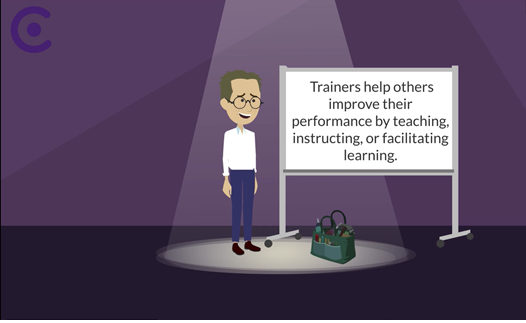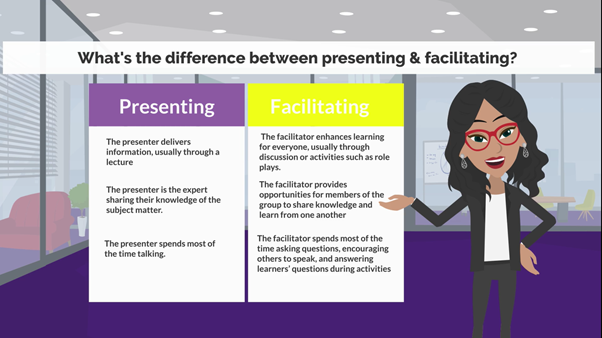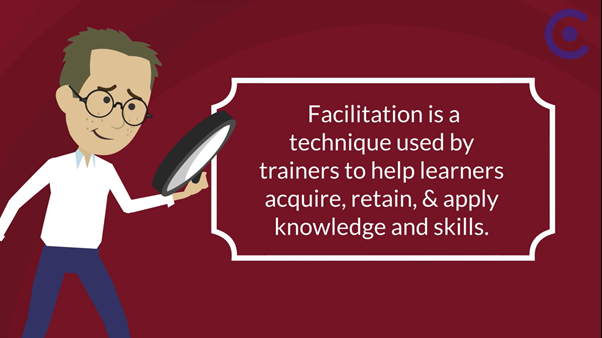What is the difference between training and facilitation?
As workplaces change and evolve, so do the requirements of skills and capabilities of employees. This is particularly true concerning the way that employees are trained and developed. In school, many of us experienced ‘chalk and talk’ where information was given to you. As we exit secondary school, the way we learn and the way learning is conducted, changes. This is where the difference between training and facilitation starts to occur.

Trainers help others improve their performance by teaching, instructing, or facilitating learning.
Technical training (hard skills) vs interpersonal skills (soft skills)
A subject matter expert often conducts technical training. For example, a qualified chef will conduct technical training for apprentice chefs. In the last 20 years or so, ‘The training department’ has morphed into Learning and Development or perhaps Training and Development. In addition to technical skills training (also sometimes referred to as hard skills), organisations commenced focussing on interpersonal skills development (also referred to as soft skills training.)
To learn more about the difference between hard and soft skills – check out our explainer video – here.
Different skills are used to teach hard and soft skills training. Training is the action of teaching a person a specific skill or type of behaviour.
According to the Associated of training development, Facilitation is “the act of engaging participants in creating, discovering, and applying learning insights. In contrast to presentations, which is typically characterized by a “an expert on the stage” delivering content to an audience, facilitation usually involves a “guide on the side” who asks questions, moderates discussions, introduces activities, and helps participants learn. This necessary and evolving skill is particularly important for talent development professionals who conduct in-person or virtual training, but other professionals can also use it facilitate team projects, task forces, committees, and meetings of any type.”
Done right, facilitation isn’t about boring presentations. Excellent facilitators know how to jump right in, establish an objective, create a format packed with interactive opportunities for discussion, and lead groups of all sizes toward constructive solution and learning.
Presentation skills are different again. Presentation is an activity in which someone shows, describes, or explains something to a group of people. By its nature, presentations are mono-directional. The presenter stands and presents information to the audience or learners. Interaction is generally limited to questions and answers at the end of the presentation.
Technical Trainers often have more knowledge than the learner, have a pre-prepared agenda, use exercises to enable the learners to connect with the content and grow their knowledge. For accredited training, assessments will be conducted to check understanding and competency.
A facilitator is generally, not a content or knowledge expert, and they hold the space for the group to evolve and grow through a topic or question they are examining. A facilitator will know how to move a group through the decision-making processes, will enable problem-solving and intervene when appropriate.
The essential first difference between the two fields is first and foremost that training is about passing on learning and content. The training provides theory, information and activities to share and help retain the information.
On the other hand, process facilitation is about helping thinking in a group.
The main difference is in almost simplistic terms: training is about learning and facilitation is about thinking.
The second big difference is that the trainer has to offer quite a bit of content in large or small blocks. So, the emphasis is on a hierarchical model where the trainer is the teacher and the learner is the student.
The facilitator model is based on collaboration. It is a group of peers who have come together whom themselves have the content. They need a structure to think through the information they have in a way that will result in something new and different. The facilitator provides the tools, fabric, flow, calm, presence and energy to guide the group.
The third is that the trainer is helping the group to apply the content he or she has given them. So the training would ideally contain a lot of demonstrating, practising, and reinforcing of the concepts that have been shared.
In the facilitator model, the emphasis is more on communicating. It is about helping team members share their data points, experiences, understand one another, build the cohesiveness of ideas and find ways to solve problems, including the introduction of new models and concepts.
The final difference between the trainer and the facilitator is that the trainer is focused on achieving a longer-term outcome. They know that one day or two days or even five days of training is not going to have an immediate impact necessarily. The concepts must be continually reinforced, practised, refined for each situation. If this is done well, in the long term, you will see some change.
Ok, so we have explained the difference between training, facilitation and presenting, where do education and soft skills development come into it?
According to Southern New Hampshire University says the following regarding education versus training:
“Traditionally, training has been concerned with specific skills and shorter time frames. For example, how to program a CNC machine or how to handle specific types of customer interactions.”
“Education, on the other hand, has been more about teaching someone a broad set of skills – such as critical thinking, researching and presenting information, and other traditionally ‘soft’ skills – that are transferable across a variety of fields.”
Soft skills training is generally conducted via both training and facilitation skills. The soft skills trainer is usually an expert in this field and adapts to the needs of the audience. Facilitation skills are used to engage learners via storytelling and sharing of personal experiences. The facilitator /trainer leads the learners to meet the learning outcomes via application of multiple learning modalities.
So, are you a trainer, facilitator, presenter or educator?
About the author: Colleen Condon
Colleen likes to keep things creative in all that she does, often using marshmallows as a source of inspiration.
Everyone knows that ongoing learning is essential for both personal and professional success and yet, for many, this means hours of attending dead boring training or completing’ losing the will to live’ eLearning modules. Colleen’s mission is to end tedious professional development while ensuring targeted outcomes for learners and businesses.
Colleen has honed her skills over the last 20 years across multiple industries and locations. Her previous role saw her overseeing the training and development needs of over 60, 000 employees across 13 countries in the APAC region. This enabled honing skills that celebrated diversity and understanding human commonality through learning, and that in the absence of a common language, flip charts and coloured markers can overcome most challenging situations.
After taking a ‘go away package’, in 2019, Colleen founded her own business, Facilitated Training, harnessing her global learning experiences and sharing them through ready to use learning resources, specialising in leadership, mentoring, guest speaking, creative problem solving, filling the gap of high quality, customisable training resources and tools.
Check out examples of our training materials and references here:
Training skills for subject matter experts – reference guide
Killer presentation skills – how to wow your audience
Introduction to Training adults – Train the trainer skills
Facilitated Training has the solution that you need. Customisable training materials that can be used again and again. Insert your company logo, add in case studies or examples from your workplace, or train using the quality training materials, as is.
Facilitated Training is your one-stop-shop for world-class, customisable training and professional development resources. Facilitated Training offers training and organisational development resources to facilitators, trainers, coaches, HR managers and individuals.
Specialising in customizable leadership and management skills, Facilitated Training features a wide variety of products, including Training resources, Professional development courses, assessments, ebooks, videos and more.
#professionaldevelopment #humanresources #learninganddevelopment #softskillstraining #trainingtips #trainingmaterials #humanresourcesmanagement #learningtips #instructionaldesign #skilldevelopment #editablecourseware #leadership #humanresourcesprofessional #coursewaredevelopment #management #training #learnfast #subjectmatterexperts #sme #facilitation #facilitate #train #trainingresources #trainthetrainer #adultlearning


